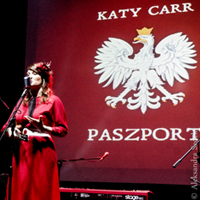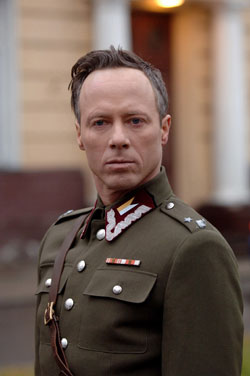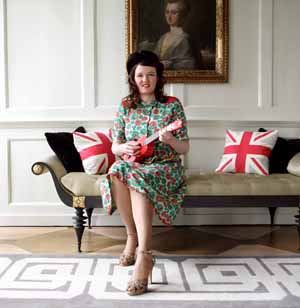 Before you read on, watch this: Kommander’s Car.
Before you read on, watch this: Kommander’s Car.
It’s Katy Carr’s newest single. You may find yourself singing, “we gonna drive away-ay-ay, we gonna drive away-ayay,” like I’m doing right now. It happens each time I listen to the song, which tells the true story of a daring 1942 Auschwitz escape by a young Polish Boy Scout, Kazimierz Piechowski. Katy wrote the song not knowing he was still alive. When she found out he was, she went to Poland to meet him – and says that meeting changed her life.
The very talented Ms. Carr released her album Paszport in Poland on Sept. 17, 2012. That’s when I first heard of her – Polish websites and news feeds were abuzz with news of the young Polish-British singer/songwriter. She chose the date specifically: It’s when Soviet Russia invaded Poland in 1939. Nazi Germany had, of course, invaded Poland on September 1, beginning the terrible second world war.
I began googling her, and found an interview she’d given to a Polish TV station in Chicago. In it, she’s wearing a 1930s red-and-white outfit and tiny tilted red-and-white hat, a Warsaw Uprising armband, and speaking Polish with a posh British accent. I thought, who is this girl? We must talk.
We chatted on the phone on a chilly fall afternoon. She’d just finished shooting a video and I was home with a cold. We were both a bit sniffly (the woods she’d been shooting in were very damp, she said) but also very excited to be speaking with each other. She’s been touring lots, and includes screenings at her concerts of a short documentary film she produced about her meeting Kazimierz Piechowski.
Here’s our chat.
* * *
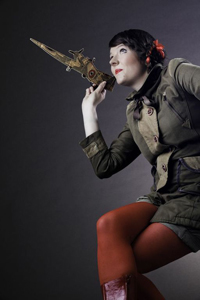 Who are your audiences? And how do people who don’t know anything about Poland or Polish history react to the stories you tell?
Who are your audiences? And how do people who don’t know anything about Poland or Polish history react to the stories you tell?
The audiences have been quite mixed here in Britain. British people of all ages, children. When we screen the film, Kazik and the Kommander’s Car, we ask that the children be 10 and older. The parents are always amazed that young boys sit very, very still. It has an incredible effect.
Kazik’s story is very exciting. It’s a story of escape and he succeeds. It’s a story of adversity where the impossible became possible. For children especially, this is very potent. And it’s a great way of finding out about Polish history.
We’ve had people crying, we’ve had people weeping, we’ve had people smiling.
Polish audiences, their reactions are slightly different to the British. Polish audiences seem to be very emotionally linked to it. British audiences are very emotionally linked too but are very angry that Poland was treated badly. British audiences, the children get very upset when they learn that Kazik was imprisoned for being a Boy Scout. So do British people – they don’t understand that Auschwitz wasn’t just for Jewish people, it’s a big revelation for them.
Polish people, they really long for their country when they see me play and the film. We’re trying to highlight the really wonderful things about Poland, and the reasons why people should fall in love with Poland, and the wonderful people that come out of Poland.
I think that Kazik is one of the most wonderful people, he’s a wonderful advocate for anything connected to Poland. He loves his country. He wants to share it with people. That’s transferred onto me. I feel like I need to tell people what happened too.
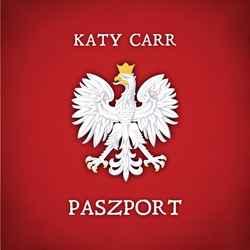 You released your single on September 17th and that’s not a date as known in the West as September 1st. People might know that the Nazis invaded on September 1st, but in Poland that second date is also so significant. Why is the date meaningful to you?
You released your single on September 17th and that’s not a date as known in the West as September 1st. People might know that the Nazis invaded on September 1st, but in Poland that second date is also so significant. Why is the date meaningful to you?
I don’t think many people in the West know that the Soviets invaded Poland as well as the Germans. I think that’s quite a misnomer in Western history and education. When I say to British people, even, “Did you know the Soviets invaded Poland on the 17th of September, and that half of Poland was occupied by Nazis and half occupied by Soviets,” people don’t seem to understand that. And then that Poland was basically given to Russia – they don’t understand why.
It was quite a significant day because of the subject matter of my music. The people who’d inspired my songs and who’d inspired me to find out about Poland and give me my love of Poland again, a lot of those people were the veterans of World War II. They were the people who survived deportation to Siberia. They survived being imprisoned there, a very long train journey, being ripped out from their homes and taken in the darkness.
I can’t imagine how traumatic it must have been, and terribly upsetting on all emotional levels to be torn out from your home country, put into a very traumatic environment geographically and climatically, and then not have the chance to return to your country – to lose your passage back.
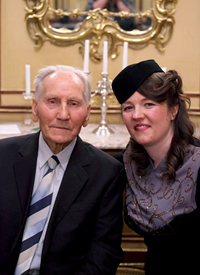
Singer Katy Carr with Auschwitz escapee Kazik Piechowski at Poland’s Embassy in London.
Mr. Kazimierz Piechowski, he told me [how] after the war had finished, he wanted to continue his studies as an engineer. But due to his involvement with the Polish partisans and the Armia Krajowa – the Home Army, the Soviet authorities in Poland sentenced him to a 10-year imprisonment. He was fighting for an independent Poland. That wasn’t what the Soviet and communist authorities were interested in promoting to the Polish public.
A lot of the veterans would tell me that they never felt free. On one side, the war ended with Germany but it didn’t end in Poland because they were thrown into another war – the Cold War.
And so it was really meaningful for me to put that record out on that day, because I wanted to honor and commemorate all the people that had shared their stories with me, and had given me a renewed interest in Poland – without whom I wouldn’t have been able to have written this record.
I call my album Paszport because of all the people who lost their right to go back to Poland. All over Europe, people couldn’t return back. And also in Poland, people couldn’t travel. Pan Kazik lost his rights as a Polish citizen when he became a number in Auschwitz. There’s lots of reasons why I called it Paszport.
There’s a poem by Jerzy Harasymowicz, it’s not a very well known poem but I think it says everything about my album. „Masz paszport, więc jesteś” – “You have a passport, therefore you exist.”
What was it like spending time with Mr. Piechowski? I’ve interviewed veterans and have this sense of duality when I’m with them. On one hand, they’ve gone through so much. And yet, here they are – normal people, and you drink tea with them and have the most wonderful chats with them.
It was a great honor. I wrote the song Kommander’s Car without knowing that Kazik was still alive. I wanted to give my song to the Museum of Auschwitz, and a lady there told me that he was alive. I had no choice; I had to meet him. There was no question in my mind: I had to give this song to him. I’d never managed to meet my inspiration. All my inspirations come from history, they’ve passed away, are not available anymore.
When I went to meet Kazik, I didn’t want him to think that I was a person coming to take his story. I didn’t know whether he’d be open to me, whether he’d like me. I didn’t speak very good Polish, and I spoke to him on the phone, and sent him a letter and a CD, and all he said was, I understand everything. So he made it very, very easy for me.
It was the most wonderful meeting. It was a hard line between being extremely excited to share this piece of creativity with him, and also not wanting to upset him, bring anything up that he didn’t want to talk about.
The effects of the meeting have changed my life. He’s given me my patriotism to Poland. Kazik injected me with a sense of longing for this country. As a teenager, my connection had ceased, like a lot of people in Polonia. It’s very hard then to come back into the culture. There was quite a bad image of Poland in the West, so I had kept quiet about my Polish roots.
When I met Kazik, he was like the grandfather I’d never met before. He’s a true patriot; he’s given his knowledge to a younger generation who can take it forward.
I watched an interview with you at a Polish TV station in Chicago, and you’re wearing a fantastic red-and-white outfit.
The style of the 1930s and 40s comes from my English grandma. She taught me how to sing songs. When my grandfather died, she didn’t speak to anybody. And then I asked her about the Second World War, and she told me about it. She told me things like, even though it was a really awful time, it was a time when everybody helped each other. It was a fantastic show of camaraderie.
She showed me some pictures, and her dresses. I thought, they’re beautiful and I love the hairstyles. And then she gave me some of her dresses, and she gave me a hat. I just realized that my body is really suited to this era. They’re really lovely dresses to wear, and I don’t like wearing modern dresses, because they don’t fit my figure. I don’t feel feminine in them. I like the 30s and 40s clothes because I like the way they’re cut. And I like the fact that they have lots of different seams and they’re beautifully made.
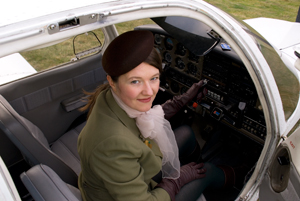
Katy Carr at Denham Airport
You’re also an aviator – which is awesome.
When I was a teenager, I had to be kept out of mischief because I was called a bit disruptive. There was a thing in our school called the Air Cadets, which is an off-branch youth organization connected with the Royal Air Force. Every weekend we could go shooting and we could go flying. And we could do lots of physical exercise. It really inspired me. I loved getting into the uniform and loved going and spending my weekends waiting to fly the airplanes.
I love music but my heart was into flying planes, and learning everything about the aircraft and being very actively involved with all the people who were connected with the Air Cadets. There weren’t very many women, or girls, doing it. So oftentimes I would have to be with just men. I quite liked being in male company.
Flying was a thrill. When I first did it when I was 13, this pilot took me in this plane called a Chipmunk. We did a loop, we did a slow turn and I thought, this is it. This is it, man. It was love – it was love in the air. I couldn’t get enough of it.
Poland has these amazing World War II pilots; everything in your life seems to be tied together.
Without the Polish air effort fighting alongside the Royal Air effort, we certainly wouldn’t have won the Battle of Britain, and we would probably be under German rule right now. So we do have to be extremely grateful for their contribution.
Your mum is Polish and your dad is Scottish-English. How did they meet and end up in England?
My mother was laying pipelines for an oil company in Poland and my father was an electrical engineer and they met in a place called Włocławek. Don’t quite know what happened on the first night but it got quite jolly and they must’ve clicked. I lived in Poland for the first five years of my life, because my father was working there.
It was communist Poland then. The złoty, one minute it would be like 2,000 for a loaf of a bread, and then the next moment it would be like 100. The fluctuation in currency was quite pronounced.
The family had to wait in queues for a refrigerator, because only a certain number were being delivered to the town. Everyone wanted to queue but when you got to the front of the line only six were delivered. The first six people got them, and then you had to have something substandard.
I remember I ate an orange and I threw the orange peel in the bin and [my auntie Wanda] went to the bin and took the orange peel out. Then she sugared it and used it for her cake. You really couldn’t get sugar peel there. It sounds insane.
When did you leave Poland?
In the mid-80s. We would go [back] for holidays. We’d see quite a lot of the communist Poland. I didn’t realize how valuable that was – seeing Poland in that state – until now, because it’s changed quite significantly.
What are you working on now?
There are a couple of dreams I want to fulfill. I want to do a tour of the top 10 universities of Poland. Then I want to do a tour of Polonia around the world. I want to continue my tour of Polonia in America. I want to play for Polish people in America. When I play for them, they say that I’m their voice because a lot of them don’t have a voice. I want to meet as many Polish people as possible – I love them, I think they’re amazing.
I’d like to inspire people my own age to get involved with Poland again by sharing these stories from the Polish past, and the people that managed to achieve such incredible things with such little support.
There’s nothing to be frightened of. Very beautiful things come out of Poland. We’ve got to be really proud of who we are.
CR
Watch
The film Katy made with director Hannah Lovell of Katy’s meeting with Kazimierz Piechowski.
In it, a 90-year-old (and incredibly spry) Kazik shows Katy around his garden, his home, a monument dedicated to his fellow Scouts who were killed during the war. She plays her song for him and his wife Iga; he calls Katy “mój skarbie” – “my treasure.” It’s lovely and moving and very much worth a look.
Imagery
Courtesy of Katy Carr
